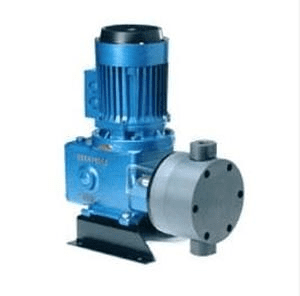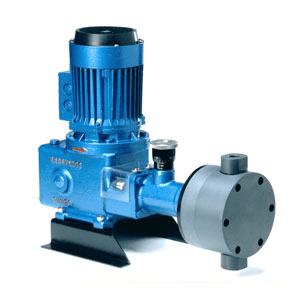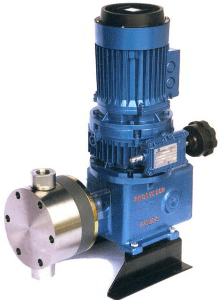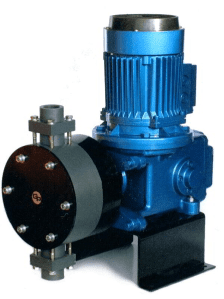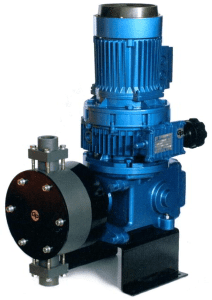Diaphragm Pumps
Delivering up to 1200 litres per hour at up to 10 bar pressure
On this page
- About
- Typical applications
- Explore our range
- Custom diaphram pumps
- FAQs
Diaphragm pumps are positive displacement pumps. They utilize contracting and expanding cavities to move fluids. Diaphragm pumps work by flexing the diaphragm out of the displacement chamber. When the diaphragm moves out, the volume of the pump chamber increases and causes the pressure within the chamber to decrease and draw in fluid. The inward stroke has the opposite effect, decreasing the volume and increasing the pressure of the chamber to move out fluid
The Grosvenor Diaphragm Pump Range is available with wetted parts in high grade engineering plastics or 316 Stainless Steel, allowing the safe handling of a wide range of aggressive liquids. The lack of a traditional gland prevents leakage. A secondary diaphragm can be fitted to maintain flow, should the primary diaphragm rupture. Sensors are in place to trigger remote or local alarms. Mechanically actuated diaphragm pumps require minimal maintenance . The pump head can function dry.
The standard pump head is made from uPVC or 316 Stainless Steel with a PTFE diaphragm. Standard units operate up to 60 degrees C, however, other materials are available on request to deal with a greater temperature range. Valve balls are available as standard in glass, polypropylene or Stainless Steel. Valve assemblies are 316 Stainless Steel or Brass.
These pumps deliver up to 1200 litres per hour at up to 10 bar pressure. This enables the efficient and effective separation of process fluids from external contamination.
Diaphragm pumps are so versatile, they are used in virtually every industry that requires fluid transfer. They are often used for dewatering or water removal across many different industries. They are commonly used for filling, dispensing and metering due to their efficiency and accuracy.
Grosvenor Pumps also supply an Oil Supported Diaphragm Pump which delivers up to 50 litres per hour at up to 70 bar pressure. This is a variable output pump with high efficiency valves. This model is extremely popular with Aid Agencies for the chlorination of drinking water.






Typical Applications for Grosvenor Diaphragm Pumps Include:
- Food and Beverage Industry
- Pulp and Paper Industry
- Surface Coating Industry
- Water Treatment
- Paint and Varnish Industry
- Petrochemical Industry
Explore our range of diaphragm pumps
Grosvenor stocks a range of standard base model diaphragm pumps on the shelf ready to go. Click to learn more or use the custom order form to talk to us about a custom solution.
All Grosvenor Diaphragm Pumps are single-acting and are driven either mechanically or by hydraulics.
Hydraulic Pumps
Utilize an intermediate hydraulic fluid on the opposing side of the diaphragm. The fluid is pressurized by a plunger or piston in order to flex the diaphragm. While their operation is similar to mechanical pumps, the hydraulic fluid contacts the diaphragm rather than a mechanical linkage. Flow is varied by adjusting pump speed or the amount of contained hydraulic fluid.
Mechanically Driven Pumps
Are operated using a simple and tough reciprocating mechanical linkage directly attached to the diaphragm’ , such as a crank or gear mechanism which converts motor rotation into reciprocating motion of the linkage (spring, piston, plunger) attached to the diaphragm. Flow is adjusted by changing the stroke length or the pump speed. Their characteristics are similar to our piston pumps and plunger pumps.
Grosvenor Pumps specialise in custom diaphragm pumps
We have been building custom pumps for over 60 years
Grosvenor Pumps understands that every pumping application requires a different solution, tailored to the needs of the specific industries worldwide. We operate a flexible manufacturing & assembly facility that enable us to offer Bespoke services to our customers. With our modular design and manufacturing in house we can build unique systems that incorporate a range of different pump heads, gearboxes, motors, stroke adjusters and more.
Our team is ready to help you build your solution.
Diaphragm Pump FAQs
Find some commonly asked questions about diaghragm pumps. For anything else, do not hesitate to contact us.

